牛津英语上海版6A_基础知识解析(unit1-5)
上海版牛津英语六年级上unitunit课本解析

1.Alice has got a lot of presents and birthday cards from her family and relatives.(1)...havegot...IthinkIhavegotone.现在完成时结构havegot在口语中相当于一般现在时have的意义,表示“有”。
不过,在美国英语中常用have,而在英国英语中则常用havegot。
他有一个兄弟。
Hehasgotabrother.(英式)=Hehasabrother.(美式)◆现在完成时结构只有一种疑问方式,即:Have/Has...got...?◆而一般现在时结构有两种疑问方式,即:Do/Does...have...?或Have/Has...?你有一把雨伞吗?①Haveyougotanumbrella?②Doyouhaveanumbrella?③Haveyouanumbrella?注意这两种结构疑问句的回答略有不同。
①—H aveyougotadictionary?—Yes,Ihave./No,Ihaven't.②—Doyouhaveadictionary?—Yes,Ido./No,Idon't.考点链接1.Doyouhaveamotorbike?(同义句)→you amotorbike?2.Idon'thaveamobilephonelikethat.→I amobilephonelikethat.(2) a lot of = lots of +可数名词复数/不可数名词I have a lot of friends.= I have lots of friends.There is a lot of water in the glass . = There is lots of water in the glass.(3) 介词frommany uncles do you haveHow many+可数名词复数+do/does+主语+have(how many在句首,名词复数跟着走)How many的用法:1)there be句型中主语的数量,如some,five,only one等提问时,如果是可数名词,不管是单是复都当复,因为说话人不知道具体的数量,而many只能接可数名词复数,所以be一定要用areHow many+可数名词复数+are there+地点或时间状语There is a book on the desk. How many books are there on the deskThere are seven days in a week. How many days are there in a weekHow much的用法:1)询问事物的数量,接不可数名词How much milk is there in the glass2)询问事物的重量How much does the pig weigh3)多少钱How much is the eraser4)询问数字计算的结果,相当于what. How much is three plus one1. ____________meat do you eat every week2. ____________ students are there in your class’re15yuan.A.HowmanyisB.HowmanyareC.HowmuchisD.Howmuchare usually go shopping with my aunt.(1) always 总是usually 通常often 经常sometimes有时候never从不表示频率,在句中可看做是插入语。
牛津沪教版六年级上6AUnit1-Unit2 重要知识点复习
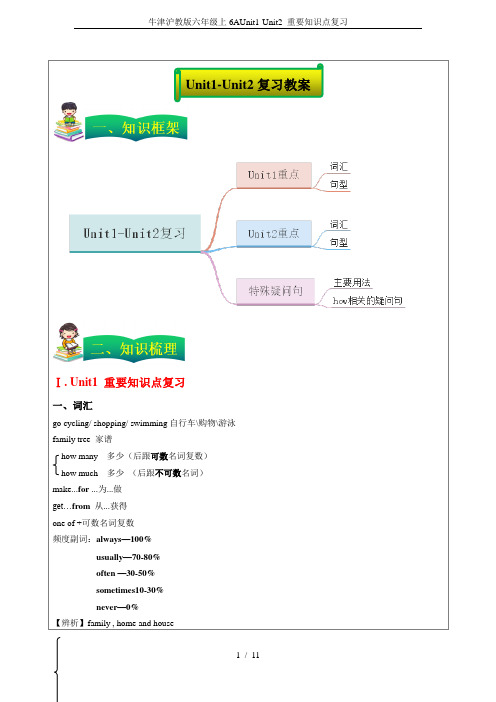
Unit1-Unit2复习教案Ⅰ. Unit1 重要知识点复习一、词汇go cycling/ shopping/ swimming自行车\购物\游泳family tree 家谱how many 多少(后跟可数名词复数)how much 多少(后跟不可数名词)make...for ...为...做get…from从...获得one of +可数名词复数频度副词:always—100%usually—70-80%often —30-50%sometimes10-30%never—0%【辨析】family , home and housefamily:“ 家、家庭、家人”。
作主语时,如果强调的是家庭成员,谓语动词用复数;如果强调的是一个家庭,则谓语动词用单数。
family tree 家谱home "家",指同家人共同生活,居住的地方,特别强调家里的氛围和环境,不一定含有建筑的意思,带有感情色彩的词。
如:hometown 故乡...house“住宅”、“房子”,指居住的房屋,建筑物。
二、语法和重点句型1. 用This is ... /These are ...来介绍家人。
二者都表示近指,“This is .. . ”后跟单数名词,“These are ...” 后跟复数名词或者多个不同的对象。
2.用how many 来询问数量后接可数名词的复数形式,当我们提问你有多少……时候,如果How many后跟人,常用how many... do you have?如果How many 后跟物,常用how many...have you got?3.What do you do with your... ? 和What else do you do with your... ? 来提问与家庭成员或亲戚一起做什么.else 意为别的其他的,常用于特殊疑问词或不定式之后,如what else, something else等。
【最新】牛津英语上海版六年级下册知识点整理

牛津英语上海版六年级下册知识点整理Module1City lifeUnit1Great cities in Asian词组:the capital of... ...的首都north-east东北from...to...从...到...in the past在过去the Great Wall长城more than=over超过eat dumpling吃饺子 tall buildings高楼大厦huge department stores大型的百货商店a lot of许多语法点:1.Beijing is north of Shanghai.北京在上海的北部。
(1)两地不相邻:A is north of B.(2)所属关系:A is in the north of B.(3)两地接壤:A is on the north of B.2.How far is it from Shanghai to Beijing?从北京到上海有多远?How far...多远。
询问距离的远近,路程的长远。
3.How long does it take to travel from Shanghai to Beijing by train?坐火车从上海到北京要多久?(1)How long...多久。
询问时间长短。
How long…多长。
用于询物的问长度。
(2)by+交通工具,表示“乘...交通工具”,用How提问。
4.It takes about ten hours.大约需要十小时It takes(sb.)st.to do sth.做某事需要花费多长时间。
5.They enjoy eating dumplings.他们喜欢吃饺子enjoy/like/love doing sth.喜欢做某事6.Two and a half days=Two days and a half两天半Half an hour=one and a half hours=one/an hour and a half一个半小时Unit2At the airport词组:plane ticket机票silk scarf丝巾 a lot of/plenty of大量的,许多departure time出发时间leave for出发去某地 have to不得不be going to将要arrive at到达boarding card登机牌name tap姓名语法点:1.Aunt Judy and Uncle Mike have lived in Los Angeles for six years.朱迪婶婶和迈克叔叔在洛杉矶已住了六年。
英语译林(牛津)版英语六年级(上册)知识点

6A Unit 1 The king’ s new clothes姓名:一, /1. long long ago好久从前2. new clothes新衣服3. make new clothes for you你制作新衣服make sth for sb4. show the king his new clothes皇帝展现新衣服show sb. sth.= show sth. to sb.5. try on穿try on the coat=try the coat ontry it/them on6. magic clothes有魔力的衣服7. walk through步行穿8. in his new clothes衣着他的新衣服9. shout at sb.某人大喊10. laugh at sb.某人大笑11. look at看⋯.12. point at指向⋯13. fit well特别合适14. an American cowboy一个美国牛仔15. a Scottish man一位格人16. tell a story一个故事17. say a/one sentence一句18. on the mountain在山上19. the next sentence下一句20. live in the house住在房屋里21. tell the boy a story个男孩一个故事tell sb. sth.22. it is one’ s turn某人的时机23. think hard努力思虑24. have to不得不have to do sth.25. in front of在⋯前.面(外面)in the front of在⋯前面(内部)26. walk by路27. be nice to sb.某人好28. look after照29. turn into成二,句型1. Long long ago, there was a king.好久好久从前,有一位国王。
牛津上海版6AUnit 1
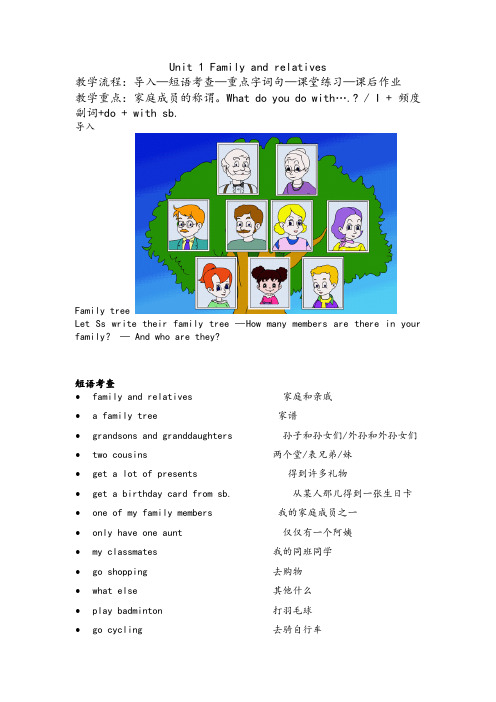
Unit 1 Family and relatives教学流程:导入—短语考查—重点字词句—课堂练习—课后作业教学重点:家庭成员的称谓。
What do you do with….? / I + 频度副词+do + with sb.导入Family treeLet Ss write their family tree —How many members are there in your family?— And who are they?短语考查•family and relatives 家庭和亲戚• a family tree 家谱•grandsons and granddaughters 孙子和孙女们/外孙和外孙女们•two cousins 两个堂/表兄弟/妹•get a lot of presents 得到许多礼物•get a birthday card from sb. 从某人那儿得到一张生日卡•one of my family members 我的家庭成员之一•only have one aunt 仅仅有一个阿姨•my classmates 我的同班同学•go shopping 去购物•what else 其他什么•play badminton 打羽毛球•go cycling 去骑自行车•go swimming 去游泳•how many + 名词复数多少……重点字词句1. relative 亲属,亲戚【解析】These are my family and relatives. 这些是我的家人和亲属。
【家人及亲属称谓】Grandfather 爷爷;外公 grandmother 奶奶;外婆Uncle 叔叔;舅舅 aunt 阿姨;婶婶Cousin 堂(表)兄弟姐妹【考点】parents 表示父母双亲; parent 表示父母中的一方,父亲或母亲2. cycle 骑自行车【解析】 I can’t cycle to school today because my bicycle is broken. 我今天不能骑车去上学了,因为我的自行车坏了。
上海牛津六年级上6A各单元知识梳理

预初期末复习Module 1 Unit 1 family and relatives 单元重点1.关键词汇Relative :grandfather, grandmother, grandson, granddaughter, uncle, aunt, cousinFamily tree, family members :father, mother, son, daughter, brother, sisterplay games/football/badminton ;go shopping/swimming/cycling ;go to a restaurant/the park ;watch TV/a film ,only ,else ,classmate2.语言功能Asking for information 询问信息1)A :How many + 名词复数+ do you have ?B :I only have one……/ I have (number)……2)A :What (else)do you do with your + 名词?B :I always / usually / sometimes / never do sth. with my + 名词Introduction 介绍:This is ……/ These are ……Express good wishes 表示祝愿:Happy birthday !3. 语法要点1)频度副词always ,usually ,often ,sometimes 和never 在一般现在时中的用法:放在be 动词、助动词后面,放在行为动词前面。
She is often late for school .When do you usually do in the morning ?He usually goes to bed in the morning .1. 主格做主语,放在句首:I often go to the supermarket . (me)2. 宾格做宾语,放在动词、介词的后面:I sometimes go shopping with him (he)3. 形容词性物主代词做定语,放在名词前面:后面必须加名词Our classroom is very big and clean. (we)4. 名词性物主代词做主语、宾语、表语:后面不能加名词Is this her T shirt ?No ,hers is red . (she)That new flat is ours . (we)3) 一般现在时:主语除了是三单主语是第三人称单数I go to school on foot . She goes to school on foot .I don’t go to school on foot . She doesn’t go to school on foot .Do you go to school on foot ?Does she go to school on foot ?Yes ,I do . / No ,I don’t Yes she does . / No ,she doesn’t动词变化①以s ,x ,ch ,sh ,o结尾+es ;②以辅音字母+y结尾,去y+ies ;③have…hasModule 1 Unit 2 I have a good friend 单元重点1.关键词汇词性转换:friend n. ……friendly a. ……friendship n.help n. v. ……helpful a. ……helpless a.kind a. ……kindness n. ……kindly ad.pollute v. ……pollution n.discuss v. ……discussion n.use v. ……reuse v. ……useful a. ……useless a.angry a. ……angrily ad. ……anger n.visit n. v. ……visitor n.词组:talk to/with sb talk about sth = discuss sthlike to do/doing enjoy doingevery day every night/morning/afternoongo out at night walk to school = go to school on footbe together play togethereat one’s lunch share one’s foodhelp each other each other = one anotherhelp other people other people = othersbe late for ask sb about sthwork hard be kind toget angry get coldshare sth with sb tell lieslive in the USA visit Garden Cityfor the first time on Saturdaya friend of the Earth pick up rubbishlook after = take care of = care for all the things around uspollute the environment air/land/water/noise pollutionkeep ……clean keep + adj; keep quiteput rubbish into rubbish bins leave rubbishtell sb to do ; tell sb not to do ask , invite , allow , want sb not to dowant to be want/agree/decide/hope/offer/try/manage + to do promise to do ; promise not to do discuss sth with sb2.语言功能1)A :Thank you! B :Not at all./ You’re welcome./ It’s a pleasure./ That’s all right.2) A :We want to look after the environment . B :All right .3.语法要点1)We like to + v ……together2)be + adj :She is always naughty/clever/friendly/helpfui比较:She always gets angry . She never tells lies.3) A:Where have you been ? B:I have been to ……A:Have you been to ___________yet?B: yes, I have just /already been to ______./Y es , I have just /already been there.No, I haven’t been to ______yet. / no, I haven’t been there yet.4) we promise to .../we promise not to ..Module 1 unit3 spending a day out together1. 关键词汇词性转换happy a.------- happily ad. -------unhappy a.sand n. ---------sandy a.sun n. -------sunny a.cloud n.-------- cloudy a. wind n. ------windy a.rain n. ------rainy a. snow n. ------snowy a.luck n. ------lucky a. ------luckily ad. ------ unlucky a.act v. ------activity n. ------ actor n. ------ actress n. ------action n.collect v. ------ collection n.important a. ------importance n.special a. ------specially ad.词组:At weekends= at the weekend on weekdaysBe far away from be nearIn sandy bay/ sunny town on lucky islandCome with sb space museumA photo of me the students of class threeBuy tickets eat ice creamHave a barbecue/a picnic/lunch/dinner spend a holidayFly tickets ride bicycles= cycleMake sandcastle collect shellsMake an album come backPlan a visit plan to do sthCome back make some notesGet there get to ShanghaiMy sixtieth birthday her ninth birthdayHave a big birthday party have a good time = enjoy oneselfPlay with sb get enough food for the party2. 语言功能1)A: Let’s go to Ocean Park . B : That’s a good idea./All right.2)A: Where have you been in -----? B: I have been to ----in---with sb3) A: Which place shall we visit? B: Shanghai MuseumWhen shall we go there ? On SaturdayWhat time ---? 9 o’clockHow are we going to get there ? By undergroundHow much does it cost? = How much is it ?How much do they cost ? = How much are they ?3. 语法要点1) 表示建议How about + n/doing? How about playing badminton?What about + n/doing? What about playing badminton?Why not + do ? Why not play badminton.Why don’t you + do? Why don’t you play badminton?Let’s + do . Let’s play badminton.2) 现在进行时表示说话正在发生的动作或目前这一阶段正在进行的动作’s nine.搭配Module 2 Unit 4 What would you like to be 单元重点1词性转换:secret a.-------secretary n .teach n.-------teacher n .drive n.-------driver n .work v .------worker n .safe n .a.-----safely ad.------safety a.fire n.-------fireman n.post .v.-----postman n. ----postage n-----poster ncook v.------cook n.-------cooker n.2词组:1.find out Please find out who broke the window .find At last he found his English book.look for Alice is looking for her new watch .2.interview sb interview her3.start work4.finish work5.put sth together6.stick sth on a display board7.in the morning/afternoon/eveningOn a cold morning on Sunday afternoon/on the evening of July 18.make our city a safe placemake sth for sb =make sb sth make a cake for us =make us a cakemake sb+adj. make me happy9.eight years old3.语言功能A.表达愿望(wishes)Would you like to be a policeman ?—Yes, I would./ No, I would not.B. 陈述原因(give reasons)Why……?Because……4.语法要点:A.I’d=I would ; would not =wouldn’tB. would like to 与want to 的转换I would like to be a nurse .=I want to be a nurse.I wouldn’t like to be a nurse.=I don’t want to be a nurse .Would you like to be a nurse ?=Do you want to be a nurse ?She would like to be a nurse.=She wants to be a nurse .She wouldn’t like to be a nurse.=She doesn’t want to be a nurse .Would she like to be a nurse?=Does she want to be a nurse ?5.职业A cook cooks food for people.A secretary takes notes and answers phones.A dentist looks after people’s teeth.A doctor makes sick people better.A nurse helps make sick people better.A pilot flies a plane.A shop assistant sells things to people.A factory worker makes things in a factory.A fireman puts out fires.A bank clerk receives money and gives money in a bank.Module 2 Unit 5 Open Day 单元重点1.词性转换:1. enter v.----------entrance n.2. music n. -------musical a.3.final a.--------finally ad.4.invite v.------invitation n.5.act v.--------activity n.6. different a.----difference n.2.词组:1.arrive at (小)in(大)+地点get to +地点到达某地Arrive at school arrive in Shanghai get to Shanghai reach Shanghai比较:arrive home/here/there get home reach home2.meet sb at +地点meet Mary at the entrance3.visit sb/sp. Visit Mr. Wang/visit Beijing4.look at sb/sth look at class project/look at me5.listen to sb/sth listen to him /listen to the music6.the Arts and Crafts room English club noticeboard7.in the library in the hall in the music room in classroom 6A8.have tea and cakes9.want sb to do sth want us to make notes10.welcome sb welcome the parents11.on the open day 12.in different places13.on the second floor 14.teachers’office15. invite sb to do sth invite Lily to have a picnic16.take some photos complete the article17. have a good time =have a great time =enjoy oneself=enjoy one’s time3.语言功能:A.询问信息(Asking for information)--When What time Where WhatWhere will kitty be? Kitty will be in the music room.B.用副词表达事情得进展顺利。
牛津英语六年级(全年级)重点知识点,句型,单词,短语整理总结
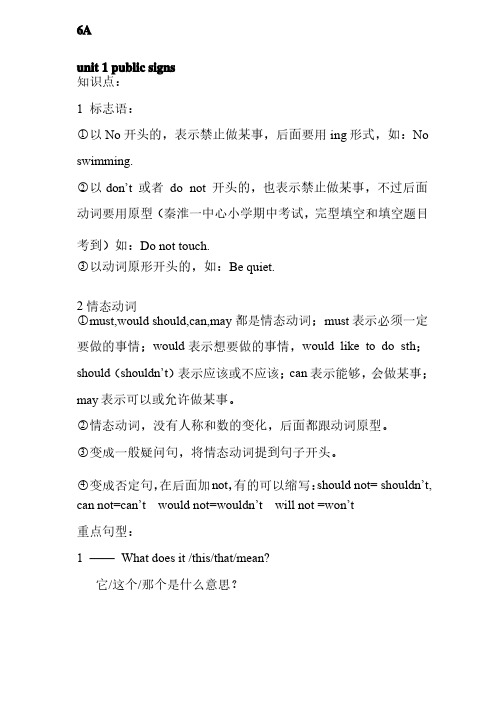
6Aunit 1 public signs知识点:知识点:1 标志语:标志语:○1以No 开头的,表示禁止做某事,后面要用ing 形式,如:No swimming.○2以don don’’t 或者或者do not 开头的,也表示禁止做某事,不过后面动词要用原型(秦淮一中心小学期中考试,完型填空和填空题目考到)如:Do not touch.○3以动词原形开头的,如:Be quiet. 2情态动词情态动词○1must,would should,can,may 都是情态动词;must 表示必须一定要做的事情;would 表示想要做的事情,would like to do sth ;should (shouldn shouldn’’t )表示应该或不应该;can 表示能够,会做某事;may 表示可以或允许做某事。
表示可以或允许做某事。
○2情态动词,没有人称和数的变化,后面都跟动词原型。
情态动词,没有人称和数的变化,后面都跟动词原型。
○3变成一般疑问句,将情态动词提到句子开头。
变成一般疑问句,将情态动词提到句子开头。
○4变成否定句,在后面加not ,有的可以缩写:should not= shouldn should not= shouldn’’t, can not=can can not=can’’t would not=wouldn would not=wouldn’’t will not =won will not =won’’t重点句型:重点句型:1 ————What does it /this/that/mean? 它/这个/那个是什么意思?那个是什么意思?It means you /wemust/should/shoudn It means you /wemust/should/shoudn’’t..意思是你/我们必须/应当/不应该。
解析:解析:当你不知道一个标志、一个词语或者一句话的意思时,可以用这句话来询问。
上海版牛津英语6A知识点整理
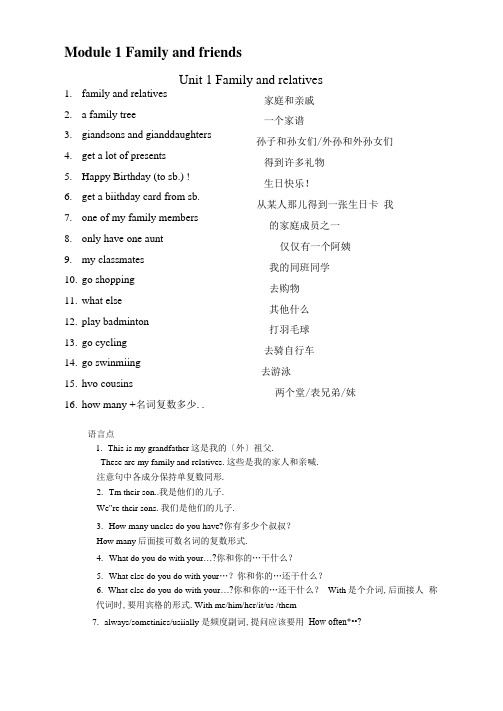
Module 1 Family and friendsUnit 1 Family and relatives1.family and relatives2. a family tree3.giandsons and gianddaughters4.get a lot of presents5.Happy Birthday (to sb.) !6.get a biithday card from sb.7.one of my family members8.only have one aunt9.my classmates10.go shopping11.what else12.play badminton13.go cycling14.go swinmiing15.hvo cousins16.how many +名词复数多少..家庭和亲戚一个家谱孙子和孙女们/外孙和外孙女们得到许多礼物生日快乐!从某人那儿得到一张生日卡我的家庭成员之一仅仅有一个阿姨我的同班同学去购物其他什么打羽毛球去骑自行车去游泳两个堂/表兄弟/妹语言点1.This is my grandfather这是我的〔外〕祖父.These are my family and relatives.这些是我的家人和亲喊.注意句中各成分保持单复数同形.2.Tm their son..我是他们的儿子.We"re their sons.我们是他们的儿子.3.How many uncles do you have?你有多少个叔叔?How many后面接可数名词的复数形式.4.What do you do with your…?你和你的…干什么?5.What else do you do with your…?你和你的…还干什么?6.What else do you do with your…?你和你的…还干什么?With是个介词,后面接人称代词时,要用宾格的形式.With me/him/her/it/us /them7.always/sometinies/usiially 是频度副词,提问应该要用How often*••?Unit 2 I have a good friend1.help each other 互相帮助2.help other people = help others3.not...at all4.go out at night5.like to be together6.walk to school together7.be friendly8.be helpful9.work hard = study hard10.be late for school11.get angiy12.be kind to others13.share sth. with sb.14.be never naughty 从不淘气15.never tell a lie/lies16.a visit to sp.帮助别人根本不在晚上出去喜欢在一起一起走去学校友好的有帮助的努力学习上学迟到变得生气对别人友善的和某人分享某物从不说谎一次去某地的参观17.live ill the USA = live in America 居住在美国18.visit sp. for the first time19.ask sb. about sth.20.hai,e/has been to sp.21.Ocean Park22.Garden City Zoo23.Water World24.Friends of the Earth25.look after = take caie of26.look after the environment27.all the things round us28.pollute the air 第一次参观某地询问某人关于某事曾去过某地海洋公园花园城市公园水上世界地球的朋友照顾,照看照顾环境我们周围所有的东西污染空气29.ak pollution30.water pollutionnd pollution32.keep sth. clean33.pick up34.put nibbish into mbbish bins35.tell sb. to do sth.36.tell sb. not to do sth.37.leave nibbish38.want to be/become39.want to do sth.40.promise to do sth.41.promise not to do sth.42.our promises 43.discuss sth. with sb.44.reuse shopping bags空气污染水污染陆地污染保持某物干净捡起,拾起把垃圾放入垃圾箱告诉某人做某事告诉某人不要做某事留下垃圾想要成为想要做某事承诺做某事承诺不要做某事我们的承诺和某人讨论某事再使用购物袋……怎么样?语言点:1.always/sometimes/usually/never 是频度副词.在句中的位置是:放在行为动词的前面,放在be动词的后面.也可以说“行前系后〞.She is always kind.她总是很善良的.She always helps other people.她总是帮助其他人.不能出现这样的句子:She is always helps other people.(X )一句话中不能同时出现两个动词.并且要注意主谓保持一致,尤其注意第三人称单数不可以忽略.2.They like to be together,他们喜欢在一起.like to do sth.=like doing sth.喜欢做某事He likes to play football.=He likes playing football,他喜欢踢足球.3.She can u t read or write.她既不会读也不会写,or用在否认句中表平列关系.and用在肯定句中表平列关系.She can read and write.她既会读又会写.4.help each other 互相帮助5.other people=others 其他人6.be kmd to sb.对某人很友好45. What about/How about sth./doing...?7.tell a lie = tell lies 说谎8.share sth. with sb.和某人分享某物She shares her bread with me .她把她的面包分给了我.9.in the USA在美国USA要大写.10.for the first time 第一次11.on Saturday具体的某一天介词用on12.Have yon been to ........ yet?你去过…..吗?Yes. I have already斤ust been to..../been there.是的,我己经去过了.No, I haven、been to .../been there yet.不,还没有去过.already/just用于肯定句中© yet用于否认和疑问句中.Unit 3 Spending a day out together1. spend a day out together——起在夕卜度过——天2.on Gieen Island3.in Happy Town4.in Dragon Bay5.on Lucky Island6.at weekends = at the weekend7.be near sp.8.be far (away) from sp9.Seaside Town10.在绿岛上在快乐城在龙湾在幸运岛上在周末离开某地近的离开某地远的海边镇a photo of my family and me 一张我家人和我的照片11.have lunch together12.Gieen Market13.In Sumiy Town14.Space Museum15.Iii Moon Town16.an activity 一项活动17.have a barbecue18.fly kites一起吃午饭格林市场在太阳城太空博物馆在月克城进行一次烧烤放风筝19.ride bicycles 骑自行车20.make sandcastles 筑沙堡21.collect shells 收集贝壳22.make an album 制作一本照片簿23.plan to do sth. 方案做某事24.a good idea —个好主意25.which place 哪一个地方26.plan a trip 方案一次旅行27.How about .......... 怎么样?〔常用于表示建议或提议〕28.be going to + v. 打算做・・・语言点:1.at weekends= at the weekend 在周末2.near/ far away from离….近/远near后直接接地点名词3.Where have you been in….?你去了哪个地方?I have been to…in/oir••我去了•••・Where have you been in Shanghai?你到过上海哪里?I have been to Century Park in Shanghai.我到过上海的世纪公园©6.a photo of my brother and me 一张我哥和我的照片.a photo of后接人称代词时,应该用宾格形式a photo of me/him/her/it/us /them7. be +V-ing表现在进行时8. cost以物作主语,通常是问价钱Take以it作主语.通常是花费时间It takes me 15 minutes to go to school.Spend以人作主语,既可以是花费金钱,也可以是花费时间.Spend time/money on sth. spend time/money in doing sth. I spend two yuan on this pen.=l spend two yuan in buying this pen.9.Which place shall we visit?我们将参加哪个地方?10.When are we going to come back?我们将什么时候回来?Come back 回来Be going to 表将来begoing to=will 11. How are we going to get there?我们将怎样到达哪里?How对交通工具进行提问.答复可以用by bus/ car e*7 on foot 12. How much does itcost?它花费多少钱?How much对价钱提问13. How about二what about怎么样?14.a.m./p.m,分别表示上午和下午.Module 2 Places and actMtiesUnit 4 Wliat would you like to be?1. different jobs不同的职业语言点:1. would like to do sth ,想要做某事2. Would you like to be a/an...?你想要成为一个Yes z I would./No, I wouldn't.是的,我 想./不,我不想.3. Why/Why not?为什么? /为什么不?I would like to be a/an.. .because ........ 我想成为….,由于….2. would like to be/become3. a secretaiy4. a bank clerk5. a policewoman6. a dentist7. a pilot8. a fireman9. a postman 10. a shop assistant 11. teach cliildren English 12. make sick people better 13. drive a bus 14. put out fires 15. cook food for people16. make our city a safe place 使我们的城市 想要成为…… 一名秘书 一个银行职员 一个女警察 一名牙医 一名飞行员 一个消防队员 一名邮递员一个商店营业员 教孩子们英语 使病人好转 驾驶一辆公交车 扑灭火 为人们烧食物 〔成为〕一个平安的地方17. interview sb. 18. find out 19. stark work 20. finish work21. in themoniing/aftenioon/e^^ening22. Why not? 采访某人查明;弄清〔情况〕 开始工作结束工作 在早上/下午/晚上 为什么不呢?I would like fried eggs for dumer tonight.我晚饭想要吃炒蛋.I fried eggs yesterday.我昨天炒了蛋.4.Would you like rice or noodles for dinner tonight?你晚饭是想吃饭还是吃面条?or在这里是标示一种选择关系.5..What kind of soup/fhut would you like?你想要哪种汤/水果?6.1 would also like some soup.=I would like some soup, too.also, too两个都可以表示“也〞,aLs.用在句中,但是to.用在句尾,并且要用逗号隔开.7.need to do sth镭要做某事.We need to buy some food first.我们需要先买一些食物口8.shopping list 购物单 .Shopping动词的mg形式在句中充当定语.9.favourite=like best 最喜欢的10.Let1 s have tomato.让我们有西红柿.Let后而接动词原形.Il in the market / in the supermarket 在市场/在超rfj12. at the fish/fiuit/meat.. .stall 在鱼/水果/肉... 摊位13. in the fish/firuit/meat...section 在鱼/水果/肉... 部门in die market,at die fish/fruit/meat...stallin die supermarket >in die fish'fhiiv'meat • • • se ction14.A:Have you bouglit any garlic?你买了一些大蒜吗?B: Yes, I have bouglit some garlic./ Yes, I have.是的,我买了些大蒜.这是个现在完成时,bought是buy的过去分词.现在完成时的构成是:have/has +动词的过去分词.它的回容许该用have/hasc Has she bouglit some oranges? Yes. she has.15.How much was it?=How much did it cost?= What was the price of it? 它多少钱.Price是“价格〞的意思.16.Where did you buy ivthem? in the supermarket in die ••• sectionUnit 5 Open Day1. an Open Day 一个开放日2. Open day programme3. . ail entrance 一个入口处4. listen to a choir5. a noticeboard6. my parents7. meet sb. at the entrance8. airive in +大地方到达一个大地方 9. arrive at +小地方到达一个小地方 10. visit the classroom11. First, ... /Next, ... /Then, .../ After that, .../ Finally, ...知识点1.1 arrive at / arrive in / reach / get to 到达 anrve at 后接小地方 arrrve in 后接大地方I arrive at school at 7:15.He will amve in Shanghai at two o'clock. reach 是个及物动词,后面直接接地点名词开放日活动安排听一个合唱队〔唱歌〕 一块布告栏 我的父母亲 在入口处迎接某人 参观教室12. look at our class projects 13. in the Arts and Crafts room 14. in the hall 15. our English Club 16. have tea and cakes 17. in the Music room18. welcome the parents on the Open Day 19. in difiereiit places 20. on the giound floor 21. write an invitation 22. take some photos 23. have a gieat'good time首先,紧接着,然后,在那以后,最后看一看我们的班级习作工程在美术劳技室 在大厅里 我们的英语俱乐部 喝茶吃蛋糕 在音乐室在开放日欢送父母 在不同的地方在第一层〔英式表达法〕 写一封邀请函 拍一些照片 过得愉快I reach school at 7:15.I get to school at 7:15.2.will / be going to都是用来表将来的,他们后面应该接动词的原形.Will是个情态动词,没有人称的变化.He will arrive in Shangliai at two o'clock.I will meet them at the entrance.Your parents will arrive at two o'clock.但是be going to有人称的变化.He is gomg to go fishing tomorrow. I am going to go fishing tomorrow. They are going to go fishing tomorrow.3.look at 看:see 看见;listento 听:hear 听见4.at die entrance 在入口处enter 进入〔动词〕in the halVin the Music room /in classroom6A' iii the Arts and Crafts room5.具体的某一天介词只能用onChi Sunday, On Sunday moming,Oii the Open Day6.在具体的某一楼层只能用介词on ,并且第几层还要用序数词On die ground floor, on the first floor, on the fifteenth floor7. want sb. to do sth. = would like to do sth.想要做某事I want you to read English everyday.我想要你们每天都读英语.1.1n die same place / in different places9.First,.../Next..../Then.../After that,.../Filially,... Fuially=at last =iii the end10.take photos 拍照IL invite邀请〔动词〕invitation邀请〔名词〕Invite sb to sp邀请某人去某地She invites me to her birthday party.她邀请我去她的生日晚会.12.on the tenth of September / on September tenth 9 月10 I i13.two fifteeii= a quarter past two 2:15Three ten = ten past three3:10 One thirty = half past one1:30 two fbrty = twenty to three 2:4014.have a great / good tmie玩得开心,过的愉快15.Parent = fatlier or mother parents = father and motheUnit 6 Going to school1.traveling time to school 去学校行走时间2.it takes sb. some time to do stli.某人花一段时间做某事3.It takes him about ten minutes.他花大约十分钟©4.half an hour 半小时5.go to sp. by ferry乘渡船去某地6.go to school on fbot=walk to school 步行去学校7.how long 多久8.get to sp,到达某地9.get to the supermarket 到达超r|j10.get there/liere/liome 到达那儿/这〕1/家里11.a restaurant 一个饭店12.a hotel 一个旅馆13.an advertisement board 一块厂•告牌14.afew + c.n.几个;一些〔后跟可数名词复数〕15.alotof+cn&un许多〔后跟可数名词复数或不可数名词〕16.on one^ way to school在某人去某地的路上17.on my way to school在我去学校的路上18.by hght rail 乘轻轨19.department stores 百货商店20.go to knidergarten 上幼儿冠语言点L near离,,很近后面直接接地点I live near school =My home is near school.我家离学校很近.2.far away from=far from 离,,很远He lives far away from school.=His home is far from school.他家离学校很远3.by bus/bike/carAmderground/traWferry其他的交通工具都能用take来表示乘,但bike 只能用ride take a bus/bike/caiAmderground/train/feny nde a bikeHe goes to school by bus =He takes a bus to school.He goes to school by bike.=He rides liis/a bike to school =He cycles to school. 4. on foot Shegoes to work on foot every day=She walks to work every day.5.It takes sb. some tune to do sth.花费某人多少时间做某事.It takes me about fifteen minutes to go to school.我去学校要花费15分钟.6.half an hour=30 minutes 用 \ half an hour 后面就不能再有minutes o7.travelling time to school去学校的旅途时间8.How long does it take you to get to…它花费你多长时间到达〞9.get to 〞到达,,〞表示“到达那里〞只能说getthere10.on one^s way to ...在某人去某地的路上On my way to school在我去学校的路上ll.some/alotof既可修饰可数名词又可以修饰不可数名词.当与可数名词连用时,只能与可数名词的复数形式连用12. a企w只能修饰可数名词,与可数名词的复数形式连用a little只能修饰不可数名词13.on the bus在公共汽车上on the underground在地铁上I see a lot of trees when I am on die bus,在公共汽车上的时候,我看见了许多树.When在本句中作连词,意为“当〞,,的时候〞14. one and a half hours=one hour and a half 一个半小时One hour and twenty minutes 一小时二十分钟Unit 7 Rules roimd us1. rules and signs 规那么和标记2. have rules in the classroom 在教室里有规那么3. have rules on die road 在马路上有规那么4. must do 必须做5. must keep quiet 必须保持安静6. must not do sth.= mustn't do sth. 不准:禁止做7. mustn't eat or dniik 不准吃或喝8. wait for 等候9. walk on the grass 走在草地上10. listen to the teachers 听老师11. run across the road 跑过马路12. pick die flowers 摘花13. enter the centre 进入中央14. climb the trees 爬树15. talk loudly 大声交谈16. turn left/nght 向左/右转17. a lift 一部电梯18. an escalator 一部自动扶梯19. on the left 在左边20. on the right 在右边21. die one on the left/right 在左边的/右边的一个22. die one in the middle 在中间的一个23. go upstairs 上楼24. go downstairs 下楼语言点1. in the library/in the classroom'm the parkon the road 在路上2. We must not walk on the grass.我们不可以踩在草上.We must keep quiet.我们必须保持安静.must 意为“必须〞表示很重要或必要.must not 意为“不准〞,表示不允许或禁止must 是个情态动词,后而接动词原形.3. aross the road 穿过马路4. wait for 等待5 .We mustn ff t eat or drink. or 用于否认句中表示“并列工and 用于肯定句中表示"并列6 .Don K t talk loudly.=We mustn fC t talk loudly.Don 〞不得,不要.该句为祈使句的否认形式.Don%后面接动词原形.talk loudly 副 词修饰动词 7 .What does this sign mean?这个标志意味着什么?What does this sign mean?=Avhat is the meanuig of tliis sigil?8 .Where can we find it?我们在哪里能找到它?9 .Which door must we use?我们必须要使用哪一扇门?情态动词的一般疑问句就是把情态动词提前,后面照抄.句号改为问号.Must we wait for the green man?10 .the one on the left/riglit 左边/右边的这个 the one in the middle 中间的这个如果是介词短语修饰the one,应该要放在the one 后而,如果是形容词应放the one 的中间 the left/riglit one die middle one12 .be late for school 迟到13 .findout 查出,弄清14 .talk to sb,对某人说,跟某人交谈.talk about sb./sth.谈论关于某人/某事.15 . tell sb. to do sth.告诉某人去做某事tell sb. not to do sth.告诉某人不要做某事It tells us to keep quiet.它告诉我们要保持安静.It tells us not to talk loundly.它告诉我们不要大声说话.Module 3 Food and DrinkUnit 8 Hie food we eat1. dinner menu 晚餐菜单2. cabbage soup 卷心菜汤25. an exit26. chase each other27. keep class rules28. break class niles 一个出口 互相追逐 遵守班级规那么 违反班级规那么3.chicken soup 鸡汤4.fried cabbage 炒卷心菜5.steamed prawns with garlic 蒜蓉蒸虫卜6.steamed fish 清蒸鱼7.fried eggs with bacon 熏肉炒蛋8.fried chicken wings 炸鸡翅9.boiled eggs 水煮蛋10.baked potato 烤上豆11.tomato and egg soup 番茄蛋汤12.after dinner 晚餐后13.What kind of...什么种类的.° °14.need to do sth.需要做某事15.would like noodles for dumer 晚餐想吃而条16.like seafood 喜欢海鲜17.m the market 在市场18.ui the supermarket 在超市19.at the fish stall 在鱼摊20.m the fhut section 在水果部门21.frozen food冰冻食物22.like to eat dumplings 喜欢吃饺子23. a packet of 一包/袋24.two hamburgers 两个汉堡包25.fiuit salad水果色拉语言点1. fbr breakfast/lunch/supper/dinnerWhat would you like for dumer tonight?今天晚饭你们想吃什么?for在这里表目的,用途2/c d=xvould "d 是would 的缩写形式.would like sth.=^vant sth.想要某物would like to do stli.=\vould love to do sth.=\vant to do sth.想要做某事like sth.喜欢某物like to do sth./like doing sth.喜欢做某事I would like some apples.我想要一些苹果.I like apples.我喜欢苹果.I would like to swim after school.放学后我想去游泳口I like swimming.=1 like to swim.我喜欢游泳.3.steamed eggs (with meat)(肉)蛋baked potato 烤上豆boiled eggs 水煮蛋fried eggs 炒蛋在这里steamed- baked .'boiled/fried都是动词的过去分词形式,在句中做定语. 相当于形容词的用法.I would like fried eggs for dumer tonight.我晚饭想要吃炒蛋.I fried eggs yesterday.我昨天炒了蛋.3. Would you like rice or noodles for dinner tonight?你晚饭是想吃饭还是吃面条?or在这里是标示一种选择关系.5.What kuid of soup/fiint would you like?你想要哪种汤/水果?1.1would also like some soup.=I would like some soup, too.also, too两个都可以表示“也〞,also用在句中,但是to.用在句尾,并且要用逗号隔开.7.need to do sth.需要做某事°We need to buy some food first.我们需要先买一些食物*8. shopping list购物单.Shoppmg动词的mg形式在句中充当定语.9.favounte=like best 最喜欢的10.Let n s have tomato.让我们有西红柿口Let后面接动词原形.11.iii the market / m the supermarket 在r|j场/在超rb12. at die fish/fruit/meat •••stall 在鱼/水果/肉,,,,摊位13. in the fisWfhiit'meat• • • section 在鱼/水果/肉〞〞部门in the market, at die fish'friiit'meat …stallin die supermarket, in die fish/fruit/meajsection14.A:Have you bought any garlic?你买了一些大蒜吗?B: Yes, I have bought some garlic./ Yes, I have.是的,我买了些大蒜.这是个现在完成时,bought是buy的过去分词.现在完成时的构成是:have,lias +动词的过去分词.它的回容许该用have/hasc Has she bouglit some oranges? Yes, she has.15.How much was it?=How much did it cost?= What was the price of it? 它多少钱.Price是“价格〞的意思.Unit 9 Picnics are fini1.plan a picnic方案一次野餐2.have a picnic进行一次野餐3.Picnics are ftm,野餐时有趣的事4.some cola 一些可乐5.spicy sausages 辣香肠6. a packet of nuts 一袋坚果7.lemon tea 柠椽茶8.Shall we...?/Lets...让我们好吗?9.taste nice with jam加了果酱尝起来美味的10.buy some snacks 买一些点心11.sweet cakes 甜的蛋糕12.salty nuts咸的坚果13.spicy chillies 辛辣的辣椒14.sour lemons 酸的柠檬15.bitter coffee 苦的咖啡16.spread some jam on the bread 在而包上抹上一些果酱17.prepare for a picnic为一次野餐做准备18.have got enough money 有足够的钱19.May I have some..please?我可以吃些吗?20.Would you like some...?你想要些© ° ° 吗?Umt 101.healthy eating健康的饮食2.good diets and bad diets好的食谱和不好的食谱3. a fbodpyramid 一个食物金字塔4.need a little fat, salt and sugar 需要一点脂肪,盐和糖5.some yogurt 一些酸奶6.plenty of大量的,充足的7.fresh fruit and vegetables新鲜的水果和蔬菜8.be unhealthy 不健康的9.have an uiiliealthy diet 有不健康的食谱10.do no exercise 不做运动11.be fit and healthy 健康的12.live in the coiuitryside 住在乡村13.stay with sb.和某人呆在一起14.become fit and healthy 变得健康的15.have some porridge for breakfast 早餐吃些粥16.be healtliier than 比0 °.健康17.be less health than 不如健康18.be as healthy as 像一样健康19.be as unhealthy as 像° 0 °一样不健康20.as... as 像口..一样:如同21.one...the other 一个」..另一个22.goodeatmghabits良好的饮食习惯23.do a quiz做一个小测试24.should do stli,应该做某事25.should not do stli. = shouldn't do sth.不应该做某事26.some suggestions for good eating habits 良好的饮食习惯的一些建议知识点:1. Shall we have a picnic tomorrow?=Let K s have a picnic tomorrow. 明天我们野餐怎么样?/我们明天去野餐吧!ice cream冰淇淋porridge 粥lemon tea柠檬茶have a little tea 喝点茶be healtliier than*,•比° °.更健康be less healthy than…比...相比,不太健康as healthy as…和°..一样健康steamed chicken 蒸鸡steamed fish 蒸鱼a lot of boiled vegetables 很多水煮蔬菜be unhealthy 不健康as unhealthy as…和° °.一样不健康知识点:1.It shows us how much of each kind of food we need every day.它显示了我们每天需要多少种各种食物.2.show sb. sth.=show sth. to sb.向某人展示某物He shows his new photo to me.=He shows me his new photo.他把他的新照片给我看了, 3.We need a little fat, salt and sugar.我们需要一点脂肪、盐和糖.need sth.需要某物4. a little修饰不可数名词some. 'plenty of/a lot of既可修饰可数名词也可以修饰不可数名词.5. a lot of > plenty of > some6.How much ...do we need ?我们需要多少 ... ?7.He had an uiiliealthy diet and did no exercise他有个不健康的饮食,并且不做运动.Exercise不可数名词©8.fit=healtliyhealtliy——iinhealtliy 一对反义词healtli名词健康healthy——unhealthy 形容词9.have breakfast/lxinch/supper/dinner 吃早饭/午饭/晚饭10.What do you usually have for breakfast/hinch,dinner?你通常早饭/午饭/晚饭吃什么?11.healtliier tliaii 比——健康less healthy than比——不健康as healthy as像——一样的健康as uiiliealthy as像——一样的不健康than用于比拟级中as…as用于原级比拟Unit 11 Let's make a pizza单词和短语make a pizza做一个比萨饼fiinny pizza有趣的比萨饼looks very interesting看起来非常有趣make one more 再做一个look at the ingredients first 先看看原料a few slices of ham 几片火腿tliree sausages 三只香肠two green peppers 三只青椒two tomatoes两个西红柿a piece of bread 一片面包a small tin of tomato sauce 一小罐西红柿酱a few chemes 一些樱桃Firstly/ Secondly/ Next'' Then /After that/ Finally 首先/第二/接着/然后/在那之后/最后a tliick piece of bread 一片猴面包as a base 做底put some tomato sauce on it在上面放一些番茄酱in the middle 在中间on the right of cherry在樱桃的右边another slice of sausage 另——片香肠on the left在左边put a slice of green pepper above each slice of sausage放一片青椒在每片香肠上面put a slice of tomato below die cherry 放一片西红柿在樱桃卜面on both sides of the bread 在而包的两边put die pizza in a hot oven把比萨放在一个热烤箱里bake it for 5 minutes 烤十分钟pastry而团cheese奶酪strawberry 草徒onion洋葱pineapple 菠萝sweetcorn甜玉米beef牛肉cherry樱桃other ingredients 其它的作料Tlie Wangs王先生一家人order food and drnik点食物和饮料知识点:1.What would you like to have as die base of your pizza? I would like...2.What would you like on yoin pizza? I would like on my pizza.3.This is …这是3. Shall we make one more?我们再做一个?5.Firstly, Secondly, Next, Tlieii, After that, Fmally6.a slice of /slices of: a tin of'' tins of: a bag o£z bags of; a piece of '1 pieces of 7,Tlie Waiigs are goi ng to Ainencaii Pizza./ Italian Pizza/ French Pizza, the + 姓氏的复数,可以表示一家人:be gomg to do sth将要做某事。
上海版牛津英语6A知识点整理
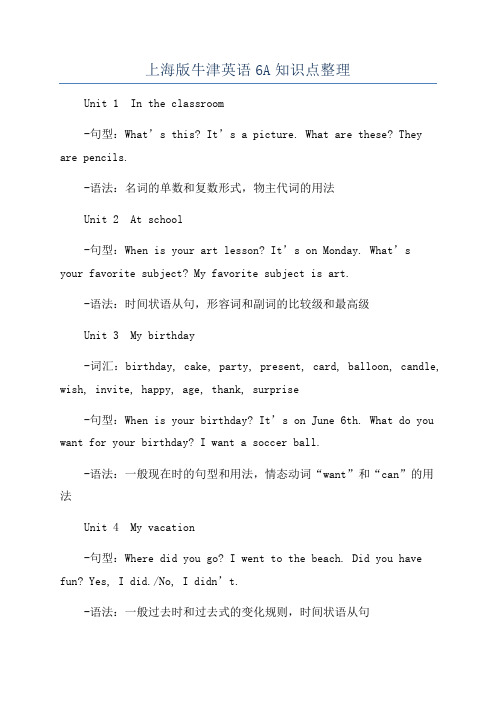
上海版牛津英语6A知识点整理Unit 1 In the classroom-句型:What’s this? It’s a picture. What are these? They are pencils.-语法:名词的单数和复数形式,物主代词的用法Unit 2 At school-句型:When is your art lesson? It’s on Monday. What’syour favorite subject? My favorite subject is art.-语法:时间状语从句,形容词和副词的比较级和最高级Unit 3 My birthday-词汇:birthday, cake, party, present, card, balloon, candle, wish, invite, happy, age, thank, surprise-句型:When is your birthday? It’s on June 6th. What do you want for your birthday? I want a soccer ball.-语法:一般现在时的句型和用法,情态动词“want”和“can”的用法Unit 4 My vacation-句型:Where did you go? I went to the beach. Did you have fun? Yes, I did./No, I didn’t.-语法:一般过去时和过去式的变化规则,时间状语从句Unit 5 Animals and plants-词汇:animal, plant, kangaroo, elephant, lion, tiger, monkey, panda, parrot, snake, butterfly, grass, flower, tree, forest-句型:What can parrots do? They can fly and talk. What are pandas’ favorite food? Their favorite food is bamboo.-语法:情态动词“can”的用法,描述事物的特征和能力Unit 6 In the garden-词汇:garden, vegetable, tomato, carrot, radish, onion, potato, cucumber, cabbage, turnip-句型:What can you see in the garden? I can see tomatoes, carrots, and onions. What’s your favorite vegetable? My favorite vegetable is cucumber.-语法:复数形式的可数名词Unit 7 We’re going to the zoo-词汇:zoo, lion, panda, monkey, kangaroo, tiger, bear, elephant, snake, ostrich, tortoise-句型:What are you going to do? We’re going to the zoo. Can snakes fly? No, they can’t.-语法:be going to表示将来的句型和用法,否定词can’t的用法Unit 8 On the farm-词汇:farm, pig, horse, sheep, chicken, cow, duck, dog, cat, lamb, chick, puppy, kitten-句型:How many pigs are there? There are three pigs.What’s your favorite farm animal? My favorite farm animal is a horse.-语法:数词和名词的复数形式Unit 9 At the supermarket-词汇:supermarket, mall, shop, store, grocery, bread, egg, cheese, juice, milk, butter, tea, coffee, sugar, salt-句型:What do you want to buy? I want to buy some bread. How much is the milk? It’s twenty yuan.-语法:不可数名词的用法,询问物品价格的句型和用法Unit 10 Clothes-词汇:clothes, hat, shirt, T-shirt, dress, skirt, pants, shorts, socks, shoes, coat, gloves, watch, scarf-句型:What are you wearing? I am wearing a hat, a T-shirt, and shorts. How much are the shoes? They are fifty yuan.-语法:指示代词和指示形容词,描述衣物的材料和颜色Unit 11 Our body-词汇:body, head, face, hair, eye, nose, mouth, ear, hand, arm, leg, foot, finger, toe-句型:What can you do with your hands? I can write and draw with my hands. How many fingers do you have? I have ten fingers.-语法:名词所有格的用法,询问数量和回答数量的句型以上是上海版牛津英语6A教材中的部分重要知识点的整理。
牛津沪教版六年级上6A-Unit 5知识点梳理 + 拓展阅读
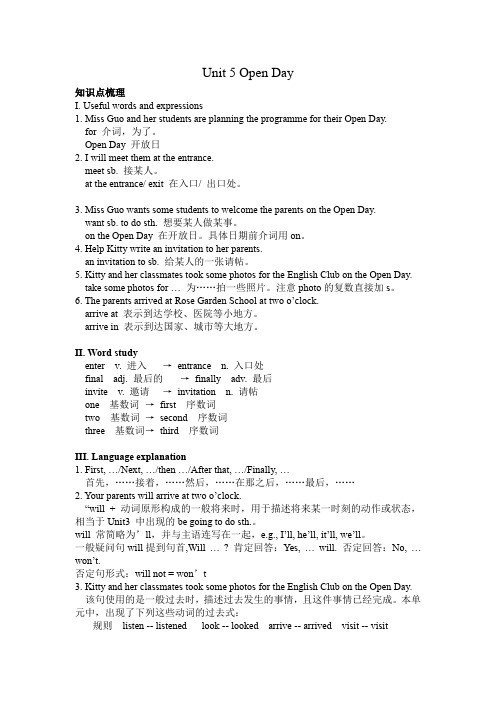
Unit 5 Open Day知识点梳理I. Useful words and expressions1. Miss Guo and her students are planning the programme for their Open Day.for 介词,为了。
Open Day 开放日2. I will meet them at the entrance.meet sb. 接某人。
at the entrance/ exit 在入口/ 出口处。
3. Miss Guo wants some students to welcome the parents on the Open Day.want sb. to do sth. 想要某人做某事。
on the Open Day 在开放日。
具体日期前介词用on。
4. Help Kitty write an invitation to her parents.an invitation to sb. 给某人的一张请帖。
5. Kitty and her classmates took some photos for the English Club on the Open Day. take some photos for … 为……拍一些照片。
注意photo的复数直接加s。
6. The parents arrived at Rose Garden School at two o’clock.arrive at 表示到达学校、医院等小地方。
arrive in 表示到达国家、城市等大地方。
II. Word studyenter v. 进入→entrance n. 入口处final adj. 最后的→finally adv. 最后invite v. 邀请→invitation n. 请帖one 基数词→first 序数词two 基数词→second 序数词three 基数词→third 序数词III. Language explanation1. First, …/Next, …/then …/After that, …/Finally, …首先,……接着,……然后,……在那之后,……最后,……2. Your parents will arrive at two o’clock.“will + 动词原形构成的一般将来时,用于描述将来某一时刻的动作或状态,相当于Unit3 中出现的be going to do sth.。
上海牛津英语6A-Unit 1 Family and relatives - Exercise 2
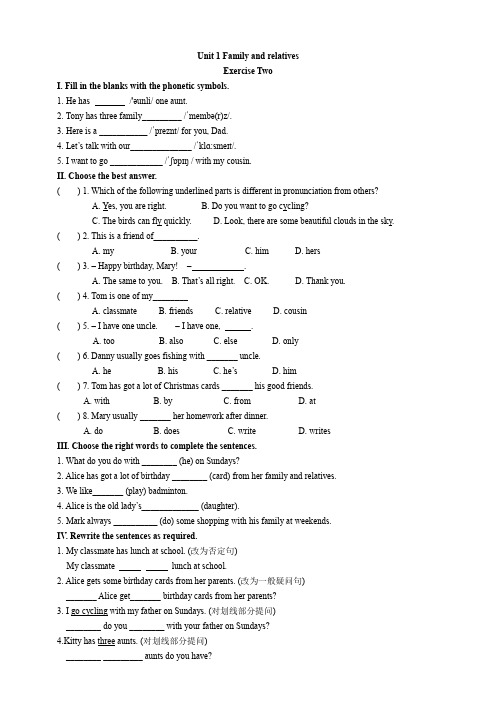
Unit 1 Family and relativesExercise TwoI. Fill in the blanks with the phonetic symbols.1. He has /'əunli/ one aunt.2. Tony has three family_________ /ˈmembə(r)z/.3. Here is a ___________ /ˈpreznt/ for you, Dad.4. Let’s talk with our______________ /ˈklɑ:smeɪt/.5. I want to go ____________ /ˈʃɒpɪŋ / with my cousin.II. Choose the best answer.( ) 1. Which of the following underlined parts is different in pronunciation from others?A. Yes, you are right.B. Do you want to go cycling?C. The birds can fly quickly.D. Look, there are some beautiful clouds in the sky. ( ) 2. This is a friend of__________.A. myB. yourC. himD. hers( ) 3. – Happy birthday, Mary! – .A. The same to you.B. That’s all right.C. OK.D. Thank you.( ) 4. Tom is one of my________A. classmateB. friendsC. relativeD. cousin( ) 5. – I have one uncle. – I have one, .A. tooB. alsoC. elseD. only( ) 6. Danny usually goes fishing with _______ uncle.A. heB. hisC. he’sD. him( ) 7. Tom has got a lot of Christmas cards _______ his good friends.A. withB. byC. fromD. at( ) 8. Mary usually _______ her homework after dinner.A. doB. doesC. writeD. writesIII. Choose the right words to complete the sentences.1. What do you do with ________ (he) on Sundays?2. Alice has got a lot of birthday ________ (card) from her family and relatives.3. We like_______ (play) badminton.4. Alice is the old lady’s_____________ (daughter).5. Mark always __________ (do) some shopping with his family at weekends.IV. Rewrite the sentences as required.1. My classmate has lunch at school. (改为否定句)My classmate lunch at school.2. Alice gets some birthday cards from her parents. (改为一般疑问句)_______ Alice get_______ birthday cards from her parents?3. I go cycling with my father on Sundays. (对划线部分提问)________ do you ________ with your father on Sundays?4.Kitty has three aunts. (对划线部分提问)________ _________ aunts do you have?5. relatives, these, are , and, people, family, my. (连词成句)______________________________________________________V. Complete the following passage with the words or phrases in the box. Each can only be used once.A. spendB. sameC. aroundD. eatE. takeIt’s very nice for a family to have twin brothers. Mark and Martin are twins. They always like the ___1___ things. For example, they like to ___2___ the same food. They like to wear the same clothes, and they __3___ their free (自由的)time together.They love cars. Their favourite cars are BMWs and Mercedes. They often take long drives to travel __4__ the country.1. _________2. _________3. _________4. _________VI. Reading comprehension.There’s a special kind of dog. These dogs are like the eyes of blind people. We call them “seeing eye dogs”. These dogs are trained for several months. Then, they live with a blind person. Their job is very important. They help blind people walk around city. Seeing eye dogs know how to cross the street. They wait for a green light. They can also avoid (避免) danger, like cars bicycles, and holes in the road. Sometimes you may see these dogs with their owners. Like most dogs, seeing eye dogs are often cute. But you should not pet them. Remember, they are working hard.( ) 1. Seeing eye dogs .A. are blindB. can’t cross the street.C. are trained to do their jobsD. don’t usually avoid danger( ) 2. Which danger is NOT talked about?A. CrimesB. BicyclesC. CarsD. Holes in the road( ) 3. When will the dogs cross the street?A.At any time.B. When there are cars in the street.B. C. They never cross the street. D. When the light is green.( ) 4. Which is true?A.All blind people have seeing eye dogs.B.In the street, blind people have many dangers to avoid.C.It’s fine to pet seeing eye dogs.D.There is no safe way to cross the street.( ) 5. What is the main idea?A.Seeing eye dogs are cute.B. Seeing eye dogs are working hard.C. Seeing eye dogs help blind people a lot.D. Streets are full of danger.Exercise Two参考答案Ⅰ1.only2. members3. present4. classmate5. shoppingⅠ1~5 ADDBA 6~8 BCBⅠ1.him2. cards3. playing4. daughter5. doesⅠ1.doesn’t have2.Does, any3.What, do4.How many5.These people are my family and relatives.Ⅰ1.same2. eat3. spend4. aroundⅠ1~5 CADBC。
上海牛津版英语六年级第一学期6A期末复习知识点总结

构成:have/has +动词的过去分词
(1)表示动作发生在过去,对现在有影响。I haveread this book three times.
(2)表示从过去某一时间开始到现在一直在做某事。I havebeen in CHINA for three years.
用法
have/has been to 去过/到过 (现在已经回来)have/has gone to 去/到(表示现在还没有回来)
连词
连词
用于连接两个简单句
2点40分:two forty = twenty to three
上下午
上午和下午用a.m.和p.m.来表示。at 10 o’clock a.m.
顺序
First,……Next,……Then,……After that,……Finally,……
Finally = at last = in the end
take
花时间
主语为it
It takes sb. some time to do sth.It takes me 10 minutes to go to school.
spend
花钱/时间
主语为人
Spend time/money on sth.spend time/money in doing sth.
already已经/just刚刚(多用于肯定句,放于动词前)。
I have already been to Lily’s home.(已经到了)I havejustbeen to Lily’s home.(刚刚到)
yet迄今,还(多用于疑问句和否定句,放于句末)
Have you been to Lily’s home yet No, I haven’t been to her home yet.
上海牛津版英语六年级第一学期6A期末复习知识点总结
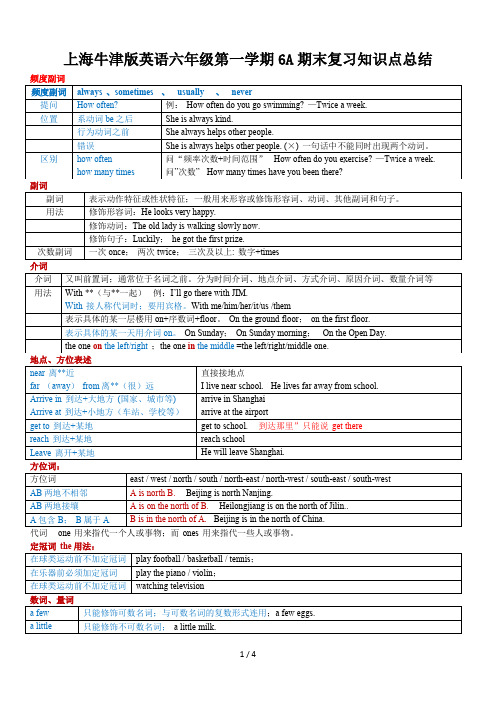
构成:have/has +动词的过去分词
(1)表示动作发生在过去;对现在有影响。I have read this book three times.
(2)表示从过去某一时间开始到现在一直在做某事。I have been in CHINA for three years.
用法
have/has been to 去过/到过 (现在已经回来) have/has gone to 去/到(表示现在还没有回来)
表示具体的某一层楼用on+序数词+floor。 On the ground floor; on the first floor.
表示具体的某一天用介词on。On Sunday; On Sunday morning; On the Open Day.
the oneonthe left/right;the oneinthe middle=the left/right/middle one.
a quarter of 四分之一 three quarters of 四分之三
交通工具
by bus/bike/car/underground/train/ferryHe goes to school by bus.
take a bus/car/underground/train/ferryHe takes a bus to school.
代词 one 用来指代一个人或事物;而 ones 用来指代一些人或事物。
定冠词 the用法:
在球类运动前不加定冠词
play football / basketball / tennis;
在乐器前必须加定冠词
play the piano / violin;
牛津英语上海版六年级第一学期 6A Unit 5教案设计(4课时,含教后感)
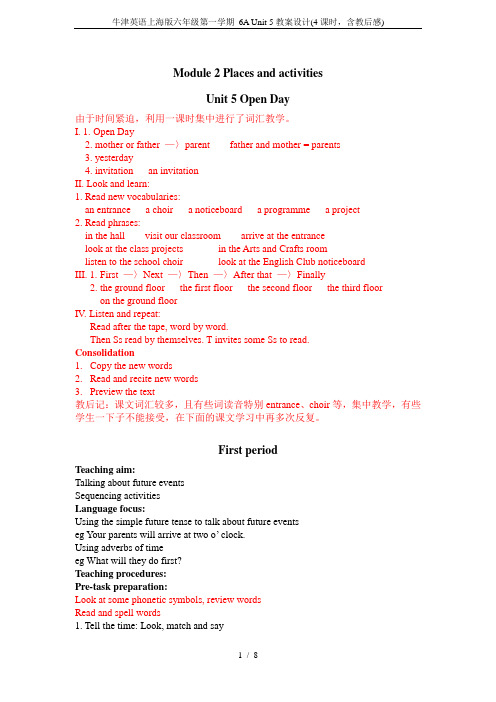
Module 2 Places and activitiesUnit 5 Open Day由于时间紧迫,利用一课时集中进行了词汇教学。
I. 1. Open Day2. mother or father —〉parent father and mother = parents3. yesterday4. invitation an invitationII. Look and learn:1. Read new vocabularies:an entrance a choir a noticeboard a programme a project2. Read phrases:in the hall visit our classroom arrive at the entrancelook at the class projects in the Arts and Crafts roomlisten to the school choir look at the English Club noticeboardIII. 1. First —〉Next —〉Then —〉After that —〉Finally2. the ground floor the first floor the second floor the third flooron the ground floorIV. Listen and repeat:Read after the tape, word by word.Then Ss read by themselves. T invites some Ss to read.Consolidation1.Copy the new words2.Read and recite new words3.Preview the text教后记:课文词汇较多,且有些词读音特别entrance、choir等,集中教学,有些学生一下子不能接受,在下面的课文学习中再多次反复。
小学英语六年级上册(牛津上海版) Unit6 going to school 知识点总结
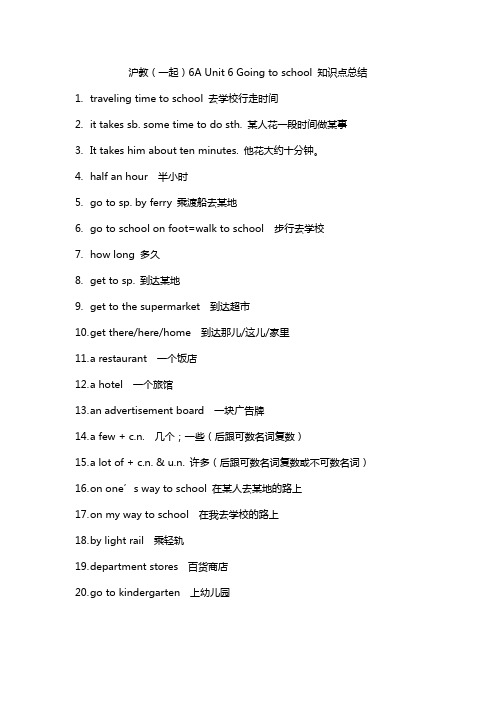
沪教(一起)6A Unit 6 Going to school 知识点总结1.traveling time to school 去学校行走时间2.it takes sb. some time to do sth. 某人花一段时间做某事3.It takes him about ten minutes. 他花大约十分钟。
4.half an hour 半小时5.go to sp. by ferry 乘渡船去某地6.go to school on foot=walk to school 步行去学校7.how long 多久8.get to sp. 到达某地9.get to the supermarket 到达超市10.g et there/here/home 到达那儿/这儿/家里11.a restaurant 一个饭店12.a hotel 一个旅馆13.a n advertisement board 一块广告牌14.a few + c.n. 几个;一些(后跟可数名词复数)15.a lot of + c.n. & u.n. 许多(后跟可数名词复数或不可数名词)16.o n one’s way to school 在某人去某地的路上17.o n my way to school 在我去学校的路上18.b y light rail 乘轻轨19.d epartment stores 百货商店20.g o to kindergarten 上幼儿园语言点1. near 离…很近后面直接接地点I live near school.=My home is near school.我家离学校很近。
2. far away from=far from离…很远He lives far away from school.=His home is far from school.他家离学校很远3.by bus/bike/car/underground/train/ferry动词短语:take a bus/bike/car/underground/train/ferry ride a bikeHe goes to school by bus.=He takes a bus to school.4. on foot 动词:walkShe goes to work on foot every day.=She walks to work every day.5. It takes sb. some time to do sth. 花费某人多少时间做某事。
小学英语六年级上册(牛津上海版) Unit6 going to school 知识点总结

沪教(一起)6A Unit 6 Going to school 知识点总结1.traveling time to school 去学校行走时间2.it takes sb. some time to do sth. 某人花一段时间做某事3.It takes him about ten minutes. 他花大约十分钟。
4.half an hour 半小时5.go to sp. by ferry 乘渡船去某地6.go to school on foot=walk to school 步行去学校7.how long 多久8.get to sp. 到达某地9.get to the supermarket 到达超市10.g et there/here/home 到达那儿/这儿/家里11.a restaurant 一个饭店12.a hotel 一个旅馆13.a n advertisement board 一块广告牌14.a few + c.n. 几个;一些(后跟可数名词复数)15.a lot of + c.n. & u.n. 许多(后跟可数名词复数或不可数名词)16.o n one’s way to school 在某人去某地的路上17.o n my way to school 在我去学校的路上18.b y light rail 乘轻轨19.d epartment stores 百货商店20.g o to kindergarten 上幼儿园语言点1. near 离…很近后面直接接地点I live near school.=My home is near school.我家离学校很近。
2. far away from=far from离…很远He lives far away from school.=His home is far from school.他家离学校很远3.by bus/bike/car/underground/train/ferry动词短语:take a bus/bike/car/underground/train/ferry ride a bikeHe goes to school by bus.=He takes a bus to school.4. on foot 动词:walkShe goes to work on foot every day.=She walks to work every day.5. It takes sb. some time to do sth. 花费某人多少时间做某事。
牛津英语上海版6A基础知识解析(unit15)(活动za)

1.家谱(.)亲戚(.)孙子(.)孙女(.)堂兄弟,堂姐妹(.)外甥(.)侄女,外甥女(.)另外,其他(.)能的。
(.)能力。
(.)使......能够. .告诉某人关于某事做菜. . . .给某人看某物洗碟子做游戏猜字谜去购物(1)询问信息?这是谁?这些是谁?......? ......几岁?:?你有多少......?:...... ......我有我只有一个......:......?你通常和你的......做......?:. ......我总是通常有时候从不和我的......做......(2)介绍......这是这些是......() …?你和你的…还干什么?是个介词,后面接人称代词时,要用宾格的形式。
() ?你有多少个叔叔?后面接可数名词的复数形式。
(), , , , 等被称为频度副词,提问应该要用…?通常情况下常用于一般现在时态的句子中,表示经常发生的习惯性动作或自然现象或事实。
表示动作的重复频率最高,其次,再次,表示动作从未发生。
.我经常告诉他关于学校的事。
.我从未给他们看我的家庭作业。
(3)(连系动词). “看起来......”.1.(.)朋友; (.)友好的(.)爱。
(.)可爱的(.)乐于助人的。
(.)无助的(.)帮助相互帮助. .帮助某人某事. () .帮助某人做某事其他人(.)生气的。
(.)生气(.)生气地一起.对某人和善. .与某人分享某物.她把她的面包分给了我。
撒谎在具体的某一天用介词 在周六在冬天的一个晚上 在五月九日. .照顾某人 . .好好照顾某人(.)找到(不经意找到) 找到(经过努力找到) 寻找(不知道结果) 拾起,捡起. .把某物放在某地 .承诺做某事. 承诺不要做某事' 遵守某人的诺言 .与某人交朋友 地球的朋友其他人说谎. . 告诉某人做某事. . 告诉某人不要做某事. . 和某人讨论某事2.(1)询问信息● : ?你和朋友喜欢做什么? : ...... .我们喜欢一起做...... ● ?你认为他她怎样?● ?我们怎样来照顾环境? (2)描述⏹ .我们喜欢在一起。
- 1、下载文档前请自行甄别文档内容的完整性,平台不提供额外的编辑、内容补充、找答案等附加服务。
- 2、"仅部分预览"的文档,不可在线预览部分如存在完整性等问题,可反馈申请退款(可完整预览的文档不适用该条件!)。
- 3、如文档侵犯您的权益,请联系客服反馈,我们会尽快为您处理(人工客服工作时间:9:00-18:30)。
Unit1 1.Words & expressionsnguage structure(1)询问信息❖Who is this?/Who are these?这是谁?/这些是谁?❖How old is......? ......几岁?❖A:How many......have you got?你有多少......?B:I have got ...... / I have only got one......我有....../我只有一个......A:What do you usually do with your......?你通常和你的......做......?B:I always/usually/sometimes/never do sth. with my......我总是/通常/有时候/从不和我的......做......(2)介绍This is....../These are......这是....../这些是......(3)表示祝愿Happy birthday!生日快乐!(4)always, usually, often, sometimes, never 等被称为频度副词,通常情况下常用于一般现在时态的句子中,表示经常发生的习惯性动作或自然现象或事实。
always 表示动作的重复频率最高,usually其次,sometimes再次,never表示动作从未发生。
I often tell him about school.我经常告诉他关于学校的事。
I never show them my homework.我从未给他们看我的家庭作业。
(5)形容词比较级的用法:Your brother looks shorter than you.你的兄弟看上去比你矮。
Your uncle looks older than mine.你的叔叔看上去比我的叔叔年纪大。
(6)look(连系动词)+ adj. “看起来......”Jim looks happy today.Unit21.Words & expressionsnguage structure(1)询问信息●A:What do you like to do with your friend?你和朋友喜欢做什么?B:We like to ...... together.我们喜欢一起做......●What do you like about him/her?你认为他/她怎样?●How can we look after the environment?我们怎样来照顾环境?(2)描述⏹We like to be together.我们喜欢在一起。
⏹She is always hardworking and she always keeps her promise.她总是努力工作并遵守她的诺言。
(3)表示承诺We promise to do......我们承诺做......(4)一般现在时态第三人称单数作主语的陈述句:Jim is a hardworking student.吉姆是一位努力学习的学生。
She is never angry.He never tells a lie.(5)already, just和yet的用法:◆时间副词:already(已经),just(刚刚),yet(还)already和just用于肯定句,置于句中、句尾皆可,yet用于否定句和疑问句中,通常放在句尾。
常用在现在完成时态中,现在完成时表示过去发生的事情对现在造成的影响,其基本形式:have/has + 过去分词。
例如,Have you been to the Ocean park yet, Winnie?温妮,你曾经去过海洋公园吗?No, I haven't been there yet.不,我还没去过那里。
Yes, I've already been there.是的,我已经去过那里。
Yes, I've just been to the Ocean Park.是的,我刚刚去过海洋公园。
have been to......和have been there的区别have been to后跟表示地点的名词,而have been there中there是表示地点的副词,后面不能再跟地点。
例如,I have already been to Shanghai Museum.我已经去过上海博物馆。
Orient Pearl TV Tower is one of the tallest towers in the world.I have already been there.东方明珠电视塔是世界上最高的塔之一。
我已经去过那里。
Unit31.Words & expressionsnguage structure(1)get there到达那里注意:home, here, there等地点副词前不加to,例如,arrive home到家,arrive at school到学校,come here到这里,come to my office到我办公室(2)have a good time = enjoy oneself = enjoy one’s time玩得愉快(3)forget to do sth.忘记要去做某事;forget doing sth.忘记曾经做过某事,例如,Don’t forget to turn off the lights when you leave the classroom.当你离开教室的时候不要忘记把灯关上。
I forget meeting you a year ago.我忘记了一年前曾经遇见过你。
(4)征求对方意见What/How about (doing) sth.? (做)……怎么样?(5)Where have you been in……?你去过…..的哪些地方?例如,Where have you been in Garden City?你去过花园城市的哪些地方?Unit41.Words & expressionsnguage structure(1)would (not) like to be/do表达愿望,表示(不)想做某事。
(相当于want to be/do,是较为婉转的表示法.)I would缩写为I'd;would not缩写为wouldn't,例如,I would like to have coffee.我想要喝咖啡。
I would like fish.我想要鱼。
---- Would you like to be a driver?你想成为一名司机吗?----Yes, I would./ No, I wouldn't.是的,我想。
/不,我不想。
注意:like用作动词时翻译为“喜欢”,其用法是●like to do sth.●like doing sth.●like sth.例如,He likes to draw. / He likes drawing.他喜欢画画。
(2)spend (spent, spent)花费❖spend (time/money) in doing sth.花费时间或金钱做某事,in可以省略❖spend (time/money) on sth.花费时间或金钱在某事或某物上,on不可以省略,例如,We often spend an hour (in) doingour homework. = We often spend an hour on our homework.我们经常花费一小时做作业。
He spent 200 yuan on this coat yesterday. (3)用because原因状语从句来说明理由。
because“因为”,提问要用why,例如,----Why would you like to be a teacher?----I would like to be a teacher because I want to teach children.Unit51.Words & expressionsnguage structure(1)用将来时谈论将来的事情will + 动词原形,一般将来时表示将要发生的动作。
例如,The school choir will sing at two fifty.(2)用副词表达事情的进展顺序。
例如,First……;Next......;Then......;After that......;Finally......(3)学习用介词表示时间。
例如,2:40------twenty to three/two forty2:20------twenty past two/two twenty(4)表示顺序的数词称为序数词;在哪一栋楼和房间的门牌号用基数词,在哪一层楼用序数词,例如,room1002,on the second floor注意:一般在基数词后面加th构成序数词,但有些词有特殊变化,例如,one→first, two→second, three→third,five→fifth, eight→eighth, nine→ninth, twelve→twelfth20至90这样的整十数字变为序数词时,只需把词尾的字母y改为ie, 再加th即可,例如,twenty→twentieth;在表达第几十几,第几百几时,只需将个位改为序数词即可,例如,twenty-two→twenty-second序数词总是和定冠词the连用。
例如,the first lesson(5)Kitty and her classmates took some photos for the English Club on the Open Day. Kitty和她的同学在家长开放日为英语俱乐部拍了一些照片。
这一句是一般过去时,句中took是take 的过去式,表示过去发生的事情。
本单元要牢记的动词过去式还有:listen→listened,visit→visited,arrive→arrived,have→had,look→looked典型练习题:I.Choose the best answer1.Mum spends one hour ____ food every day.A.to cookB.cookC.cookingD.cooked解析:本题考察动词spend的用法,其结构是“spend + 时间或金钱+ (in)doing sth.因此应选择C项。
